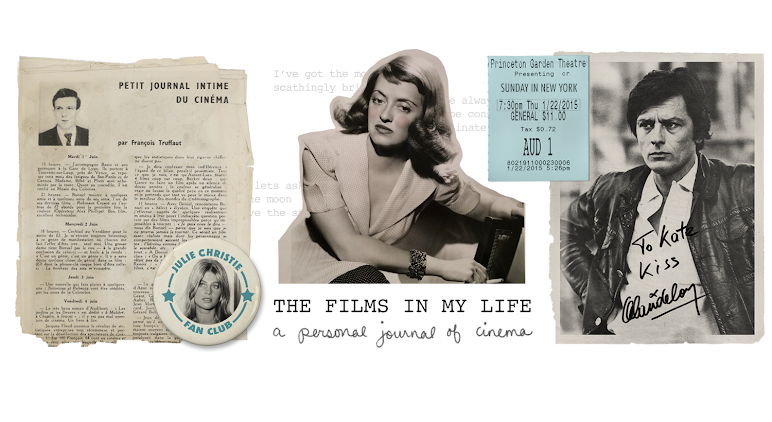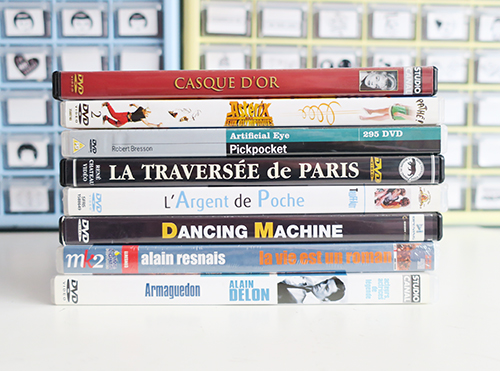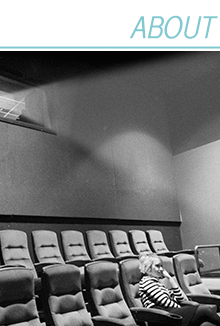
Image from The Princeton Garden Theater's instagram
Yesterday I had the pleasure of attending a screening of Anomalisa (2015) at The Garden theater in Princeton, followed by a Q&A with writer/director Charlie Kaufman. I have to admit, I'm only somewhat familiar with Kaufman's work -- I'd seen (and enjoyed) Eternal Sunshine of the Spotless Mind (2004) years ago and I watched Being John Malkovich (1999) last weekend to cram for the event -- but I couldn't pass up an opportunity to listen to one of the most interesting filmmakers of our time.
Anomalisa is a stop-motion animation, but the story and characters feel remarkably real and human. The script originated as a play, which might explain why the puppets have more emotional depth than you'd expect from inanimate objects. The story is about a middle-aged customer service expert on a one day business trip in Cincinnati for a public speaking gig. He's emotionally detached from his wife and son back in LA, and finds he's unable to rekindle the flames with an old Ohio girlfriend. When he turns his attentions to a shy woman who's in town to attend his lecture things turn sweet, then Lynchian, then sour.
I liked Anomalisa, and I thought it was exceptionally well executed, but it's not really my kind of movie. The humor was wonderfully dry and sharp - I loved that - and the attention to detail with regard to the animation was mind blowing. It's actually a rather tender movie, thoughtful about little things like a self-conscious woman hiding her hands in the sleeves of her sweater. But there's a touch of the grotesque that runs through it that is off-putting to me. I felt the same way about Being John Malkovich. It's almost as if it's a beautiful object that's coated in a layer of grime. And that's absolutely fine, and even admirable, but it's not my thing.
I didn't dislike the movie. I enjoyed watching it, for the most part (call me a prude, I probably am, but I wasn't a fan of the drawn-out sex scene between two of the puppets. I'm firmly in the "fade to black" camp) but when it was over I just felt... nothing. I knew I didn't want to watch it again, but I was glad that I had at least once.

The Q&A after the film was interesting and Kaufman was hilariously self-deprecating. My kind of humor! *high fives the air* When the moderator inquired about rumors that Kaufman is writing a novel he launched into a defense, explaining that it's the only way he could create something without having to secure financial backing up front. This way he can write the whole book and nobody has to put out any money until it's published (financing was clearly a sore-spot for him, which was especially sad. Even though I wasn't particularly smitten with this particular film, there's no denying he's a creative genius and it's heartbreaking that somebody that talented should have trouble getting his movies made.) The moderator sheepishly said he had only been offering an opportunity for Kaufman to plug his book, which prompted Kaufman to sarcastically inform us that "we'll all be dead" by the time it comes out.
Sidenote: I am very much looking forward to this book, assuming it's published before I die. While uncomfortable, slightly grungy films aren't my cup of tea, I do enjoy that type of story in fiction and my reservations about Kaufman's work are entirely visual. I think that it's probably all about the difference between picturing the story with your own imagination vs. seeing it through someone else's eyes on the screen. It's likely the reason that Kurt Vonnegut is my favorite author but I've been unimpressed by every tv or film adaptation of his work.
He answered a lot of questions with simple yes/no answers -- does the Japanese doll's unique voice at the end of the film have any significance? Yes. Was he influenced by existentialism when writing the film? No.
I think my favorite reply was when somebody asked him about likability. The audience member hadn't found the main character in Anomalisa, Michael, to be either likable or sympathetic, and they wondered if Kaufman related to the character at all. Kaufman replied that likability isn't important to him, it isn't an element he considers at all when he's writing. As long as the character feels true to who Kaufman wants them to be, that's all that matters. "Hurrah!," I silently exclaimed. While I didn't personally like the character of Michael either, that didn't factor into my assessment of the movie. I don't think that a film's value should be determined based on how much we can relate to its characters. "Likability" or the "would I want to grab a beer with this person?" test seems to be such an important factor in almost every aspect of society anymore. We often choose presidents, hire job applicants, and critique film characters based entirely on this quality. To me, a film character should be interesting and fully formed. Whether or not I personally would want to hang out with them might be a consideration if I'm taking a buzzfeed quiz titled "Which movie character should be your BFF?" but it shouldn't come into play if I'm assessing the character's existence.
Another audience member asked if Kaufman wrote because he felt compelled to, or because it made him happy. Kaufman's reply was that he's never really happy (sad face!) but that there are times when one of his films is screened and it gets a good reception and he can't help but feel slightly pleased. If you want to talk about relatable, we've got relatable sitting here in front of us.
I was enjoying myself immensely, and I started to feel a little guilty about my lukewarm feelings towards Anomalisa. The writer/director was right in front of me (literally right in front of me, because I had somehow awkwardly ended up in the center front row BY MYSELF. Nobody else in the front row. So awkward.) and he was so kind, self-effacing, intelligent, and ridiculously funny. I had to wonder if the Q&A had preceded the screening, would that have colored my opinion of the film?
I'm not going to re-watch it to find out. Sorry!
HOWEVER. It's been a long time since I saw Eternal Sunshine of the Spotless Mind and I think it's time to revisit it. I feel like I owe it to Kaufman, and it'll be nice to spend some time in a world where erasing memories is a plausible procedure. I can think of so many I'd like to dump in my proverbial trash can (let's just discard that whole folder titled "teenage years") but last night's Q&A is one I'll definitely hold onto.

























































